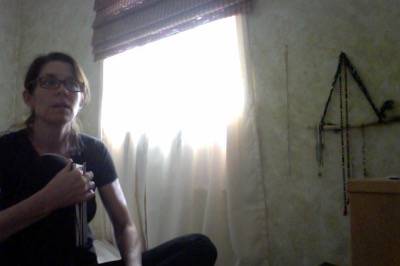
Marlys West
Poetry
Marlys West is an award-winning writer living in Los Angeles. She has been published in journals and anthologies including American Poetry Review, Best American Poetry, Burnside Review, Duende, Fence, Ploughshares, and more. She was a Hodder Fellow at Princeton University, an NEA grant recipient in poetry, and received her M.F.A. from the Michener Center for Writers. The University of Akron Press published her first book of poems in 1999. She is currently editing a new collection of poetry, writing a novel, working as a nurse, and raising children.
Regret and Other Bodies
I don’t know
which one and this is the longest set up for one tiny image
to the point where I have to question why I bring it up,
only let me be clear it’s to point out my own loneliness
and face wet with tears,
which has nothing to do with the valve waving
itself like
a white branch. Each heart contraction starts with a little
tree perfectly still then fluttering madly.
A cartoon of a twig waving hard over blood then nothing.
Perfect, said the doctor. How do I look at my daughter when
she wants to go home and play without me? I look at her
with a face full of love and distraction. Is my phone ringing?
Everything I am now trying to play standard isn’t working
but this is false, I already went over it with a dear friend
who says the time to question your life is never
seven days after someone looks at you and says he can’t,
he just can’t, it’s
all so tiring. It’s so bad his hair is falling out. Meaning me.
Meaning him. Meaning I ignored the signs
even as I dragged
my feet on other important things as all humans do.
Who gave us consciousness?
Enough of this, I have to shower and go to work and put
my children in the care of the nanny who is young and full
of promise. That ship has sailed, we said.
There are some opportunities
that never come again but are we not inhaling
the air as I write and you read? Are we not alive and able
to lift our heads even slightly? Where is hope, that sharp
fork that puts the sugar over everything like rain wets
earth telling every weed’s seed and grass root to come up
because now all drought will be forgotten, never again
the long summers without someone watering and watering
but we know this isn’t true. And yet we go on sprouting
and cutting our hair and wondering if this goes with that
does it go?
if the countertops should be granite or poured cement or if
tile is what we should be thinking, every new place in town
using the longer white tiles for now but you know it will wash
up on the beach in ten years, chips smooth and round as
teeth; the children picking them up and asking their mother
if they can keep it. She says put them in your pocket
and stop collecting everything, she says
there is sand in your hair
and everywhere;
lunch is gritty that took me an hour to pack up
and where is your father and why
am I picking apart every second and when she stands up
to dip her own body in the water every harsh word is nearly
forgotten because she is up, the mother, heading
for the breaking edge of the white water.
A miracle then, her body, and how she doesn’t care
about the spit and spray,
cuts through all that pounding water with her arms and legs
she who brought us forth with equal parts love and shouting.
“ Motherhood comes with a sense of joy and failure, and my running from and/or accepting those extremes begins with the intactness of the infant body. Is it whole? Did I already fail? Later can I make my way through the world in a way that does not leave large chunks of self floating behind me? Am I mostly intact? What did I wish for as a girl? I wanted something adult life seems to lack. Who dreams of dishes and laundry and middle age? But what if the person doing those dishes and folding clothes and aging is also burning a path through the sand? Then I will do the dishes in order to get there. Or whatever I have to do. Think about my grief at the sink, what is broken, what is repaired, etcetera. ”
